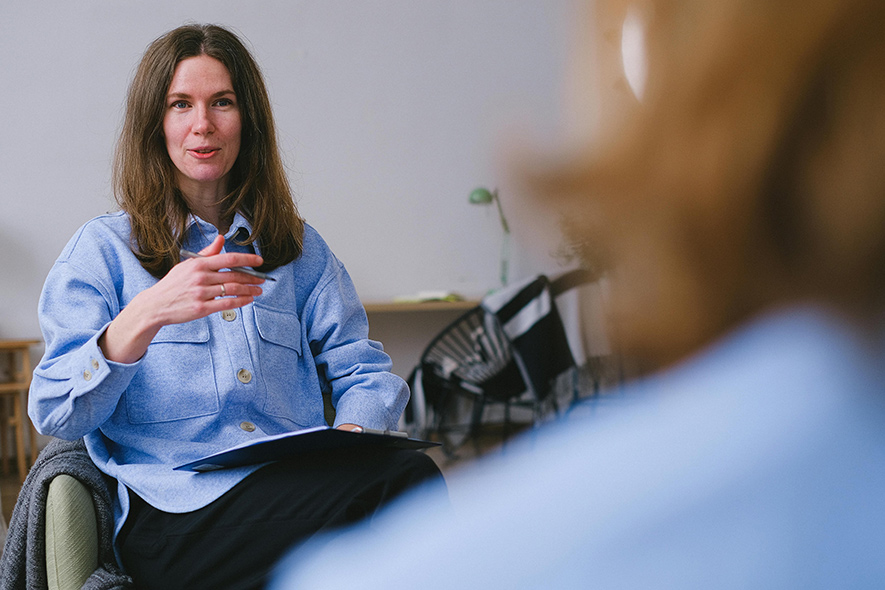Before your workshops:
- Watch short recorded mini-lectures (30–40 minutes each)
- Complete assigned readings and online activities
- Attempt ungraded quizzes to check your understanding

All fields marked with are required.

If you are curious about why people think, feel, and behave the way they do – and want to make a positive impact in your community – this diploma is the ideal first step.
Our higher education diplomas mirror the first year of their matching bachelor program, allowing you to jump into year two after graduation, while giving you a supported first year to grow your academic skills.
Enter the diploma based on past experience, study or interview, with no minimum ATAR requirements
A balanced combination of independent study and real-time live workshops to interact with lecturers and peers
Progress with up to a year credit into a related Griffith University degree
Balance study with work and personal commitments
Before your workshops:
Join live workshops:
After your workshops:

Online appointments to assist with your studies, including; assignment consultations, improving specific academic skills, creating a study structure, managing changes to your study load or circumstances and disability support.
Confidential wellbeing and mental health support.
Book individual consultations outside of workshop times.
Virtual meet-ups to network and collaborate with other online students.
HOW DO I PROGRESS INTO GRIFFITH UNIVERSITY?
When you apply for the Diploma of Social and Psychological Science you will also indicate your choice of bachelor program.
You will receive one packaged offer for both programs.
Once you graduate from the diploma, Griffith University will be in touch with information for your to enrol into you next bachelor courses.
We host information sessions to help with your transition to Griffith University.
There are three intakes a year: March, July and October.
WHAT DO I NEED TO DO TO START?
You will need a functional laptop and a stable internet connection. Your laptop must have a working camera and microphone for attending workshops and participating in presentations.
WHAT IS THE DIFFERENCE BETWEEN ONLINE AND ON CAMPUS STUDY?
Online study offers greater flexibility, allowing you to manage your learning at your own pace and from any location. It is more self-directed compared to in-person study, which includes more scheduled contact hours. Although you will be required to attend timetabled online workshops, these typically run for one to two hours per course each week.
HOW LONG WILL IT TAKE TO COMPLETE THE DIPLOMA PROGRAM?
To complete the program, you must successfully complete eight courses. The duration of your studies depends on the academic load you choose:
HOW MANY ASSESSMENTS CAN I EXPECT IN EACH COURSE?
Most courses include three assessment items, which may vary by subject. For example, some courses include two exams and a written assignment. Exams typically combine multiple-choice and short-answer questions, while written assessments require research and academic writing on a selected topic. All assessments are submitted online via Turnitin.
HOW MUCH TIME DO I NEED TO COMMIT FOR MY STUDIES EACH WEEK?
You should plan to dedicate approximately 10 hours per course per week, including the workshop time, to stay on top of readings, lectures, and activities.
Additional time may be required during assessment periods.
CAN I TRANSITION FROM ONLINE TO ON CAMPUS LEARNING?
Yes, an in-person option is available for your program. You may choose to complete the diploma fully online or switch to on-campus study. However, mode changes can only occur between trimesters— you must complete the current trimester in your selected mode before transitioning.

“I was interested in psychology and getting into the industry, but I didn’t know how I was going to do it. I knew when I found Griffith College, considering my interrupted schooling, that it would be my way into university.
I’m doing really well in my bachelor and now have the goal of progressing further into postgraduate research. I never thought this would be possible.
My tip for future students, ask for help and take up all the support resources on offer at Griffith College. They have set me up so well.”